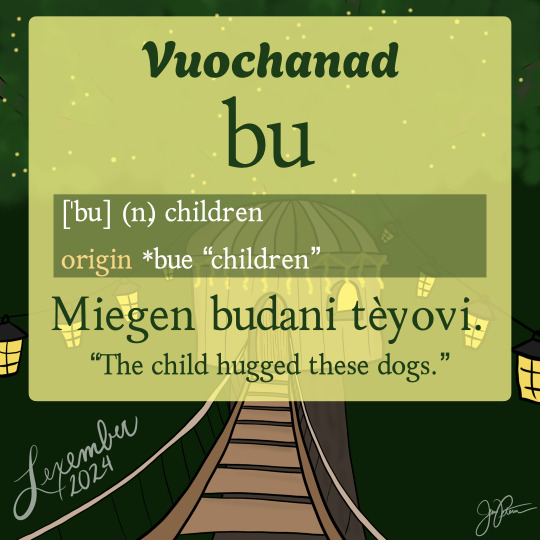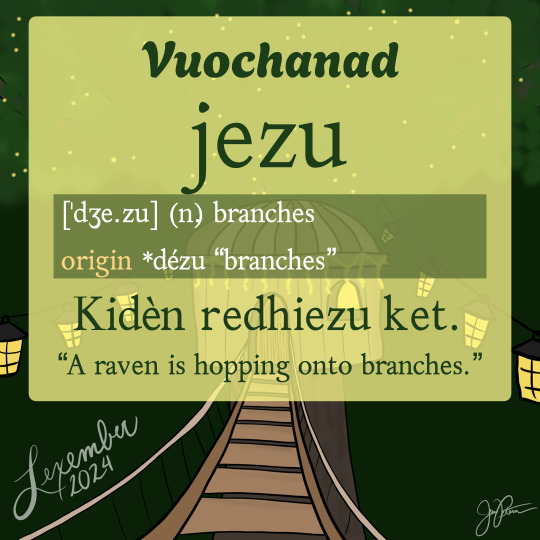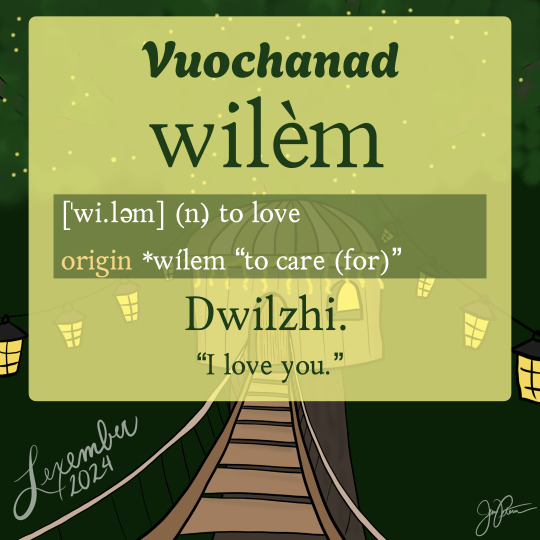Don't wanna be here? Send us removal request.
Text

The final Vuochanad word for this year’s Lexember is “liva” (“games”), from *liba. It has been a lot of fun to work on Vuochanad this month, and I look forward to expanding that work in the future.
“Mivu’e sadhi emwa’aña tèliva.” (“The friends play games together.”)
8 notes
·
View notes
Text

The Vuochanad word for Lexember 30 is “emwa” (“friends”), from *ɛmwa “siblings.” In the sentence “Mivu’e sadhi emwa’aña tèliva” (“The friends play games together”), it occurs with a suffix marking a definite reading of the noun—the apostrophe indicates vowel hiatus.
9 notes
·
View notes
Text

The Vuochanad word for Lexember 29 is “sadhi” (“together”), from the preposition phrase *sa-todzi meaning “like one.” The sentence “Mivu’e sadhi emwa’aña tèliva” means “The friends play games together.”
6 notes
·
View notes
Text

Today’s Vuochanad Lexember word is “mivum” (“to play”), featured in the sentence “Mivu’e sadhi emwa’aña tèliva” (“The friends play games together”). I’m still working out the romanization, but for now I’m using apostrophes to represent vowel hiatus.
7 notes
·
View notes
Text

Today’s Vuochanad Lexember word is “viov” (“dogs”). In the sentence “Miegen budani tèyovi” (“The child hugged these dogs”), the word has undergone some sound changes due to the addition of the accusative “tè-“ prefix. In intervocalic environments, [v] is deleted and [i] becomes [j]: tèviov > tèiov > tèyov. The “-i” suffix indicates a proximal demonstrative.
4 notes
·
View notes
Text

Today’s Vuochanad Lexember word is “bu” (“children”). In the sentence “Miegen budani tèyovi” (“The child hugged these dogs”), “bu” occurs with the class-IV definite singulative suffix “-dani.” Vuochanad has four noun classes, and nominal affixes marking definiteness reflect the noun’s class.
5 notes
·
View notes
Text

The Vuochanad word for Lexember 25 is “miem” (“to hug”), which comes from *nwem “to hold” and exemplifies two sound change of Vuochanad: (1) an alveolar consonant followed by [w] becomes bilabial, and then the [w] is deleted, and (2) stressed [e] vowels broke, becoming the diphthong [ie]. The “-m” is an infinitive marker.
“Miegen budani tèyovi” means “The child hugged these dogs.”
5 notes
·
View notes
Text

Today’s Vuochanad Lexember word is “ñemi” (“brightness”), which completes the sentence “Ye alèle yehañ alègiha tèñemi” (“The nighttime stars shiny brightly in the sky”). A more literal translation of the sentence is “The stars at night have brightness in the sky.”
4 notes
·
View notes
Text

Today’s Vuochanad Lexember word is “kiha” (“nights”). In the sentence “Ye alèle yehañ alègiha tèñemi” (“The nighttime stars shiny brightly in the sky”), “alègiha” is the locative form (“in/during nights”) and is used to modify the head noun “yehañ” (“stars”).
10 notes
·
View notes
Text

Today’s Vuochanad Lexember word is “yehañ” (“stars”), coming from Wóxtjanato *éxaɲe. While [ɲ] is not an allowable coda consonant in Wóxtjanato, it is permissible in Vuochanad—a result of unstressed final mid-vowel deletion.
“Ye alèle yehañ alègiha tèñemi” means “The nighttime stars shiny brightly in the sky.”
8 notes
·
View notes
Text

Today’s Vuochanad Lexember word is “le” (“sky”). It’s interesting to see how sound changes affect some forms and not others, and this particular word was heavily affected by sound changes, going from *xlɛ́ve (“heavens”) to “le.”
“Ye alèle yehañ alègiha tèñemi” means “The nighttime stars shine brightly in the sky.”
8 notes
·
View notes
Text

The Vuochanad word for Lexember 20 is “yem” (“to have, as in to possess a quality or state of mind”). This little verb is used for many descriptive constructions, where English might use a copular or stative verb. In the sentence “Ye alèle yehañ alègiha tèñemi” (“The nighttime stars shine brightly in the sky”), its subject is “yehañ” (“stars”), and the quality being possessed is “tèñemi” (“brightness”), as in “the stars have brightness.”
12 notes
·
View notes
Text

Today’s Vuochanad Lexember word is “jezu” (“branches”). Its form looks different in “Kidèn redhiezu ket” (“A raven is hopping onto branches”) because of old sound changes and their orderings. Without a prefix, *dézu becomes *diezu and then [dʒezu]. With a prefix, *redézu becomes *reðezu and then [reðiezu]. The sequence [ði] does not palatalize like [di] does.
15 notes
·
View notes
Text

Today’s Vuochanad word is “wilèm” (“to love, to care for”), a word used to indicate a love felt for a family member or friend. Vuochanad has object-agreement prefixes that only occur when the object is a pronoun or when the object is in focus (in which case, the object NP occurs in the clause structure, too). “Dwilzhi” means “I love you.”
The verb form is based on the name of someone I love very much, whose birthday is today.
13 notes
·
View notes
Text

Today’s Vuochanad Lexember word is “kidèm” (“to leap, to hop”). The final “-m” marks an infinitive form of this verb. In the sentence “Kidèn redhiezu ket” (“A raven is hopping onto branches”), the final “-n” indicates third-person singular present tense.
16 notes
·
View notes
Text

Today’s Vuochanad Lexember entry is a celebration of very special person in my life. This one’s for you, Kay! The word “ke” (“ravens”) comes from the Wóxtjanato *kɛ́je, and it can also be used to refer to intelligent people who have a knack for finding treasures. “Kidèn redhiezu ket” means “A raven is hopping onto branches.”
3 notes
·
View notes
Text

The Vuochanad word for Lexember 15th is “udh” (“turtles”), the final word in the sentence “Slioftudhen alofñam udhèt” (“A turtle crawled on the sand”). The proto-form *udo reduced to “udh,” with a reappearing schwa when a consonant suffix occurs, like the singulative “-t.”
4 notes
·
View notes